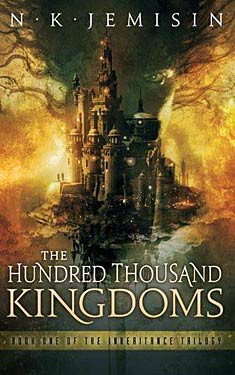NK Jemisin
Completed 3/31/2020,
Reviewed 3/31/2020
4 stars
This is my
fourth sojourn into the mind of NK Jemisin, the first three being the Broken
Earth trilogy. What strikes me the most
about her work is her imagination. Even
though the basic plot of this book has been done before and since, that of the
outsider who finds themselves suddenly heir to a throne, it’s the rest of the
book that I find fascinating: the world-building, the characters, the religion. Just like Broken Earth, it’s familiar, yet
very different from anything I’ve read before.
This book was nominated for many awards back in 2011, though it only won
the Locus First Novel Award.
 Yeine is a
leader in her own kingdom when she is summoned to the city called Sky. There she finds out she has been named heir
to the throne over all the kingdoms.
This is fraught with danger, though, as there are already two other
named heirs, against whom she must play a dangerous political game to survive. Once at Sky, she meets her other distant
relatives and most importantly the gods and godlings who also play political
games of their own.
Yeine is a
leader in her own kingdom when she is summoned to the city called Sky. There she finds out she has been named heir
to the throne over all the kingdoms.
This is fraught with danger, though, as there are already two other
named heirs, against whom she must play a dangerous political game to survive. Once at Sky, she meets her other distant
relatives and most importantly the gods and godlings who also play political
games of their own.
The plot is actually
very difficult to describe in much more detail than I gave above. In a way, there really isn’t that much
plot. The book is mostly about
relationships, with her two devious cousins who are the other heirs to the throne,
and with the gods and godlings who make up the pantheon of this world. These gods are condemned to human form as the
result of the Gods’ War some two thousand years earlier. They have powers, but are not as omniscient
as you would think. One of the main gods
known as the Three, Nahadoth, has a major role in Yeine’s time at Sky. He is a god of darkness and shadow. He is a seducer and destroyer. He is an antithesis to Itempas, a god of
light, and victor of the Gods’ War. The
third of the Three is Enefa who created the material world and is a god of the
grey. She is dead, but has a cult of
followers who are considered blasphemers.
Nahadoth has
the largest role of all the gods in Yeine’s experience at Sky, despite being an
untrustworthy ally. He is also perhaps
the most interesting character in the book, full of contradictions and
surprises. I really liked him. He is dark, devious, sensual, and powerful. But he also has a soft spot which becomes
evident in his relationship with Yeine. I
also like one of the godlings, Sieh, who has the human form of a child, which
makes for a very complicated relationship for Yeine. He’s very mature, but at the same time, plays
the role of a ten-year-old in most situations.
When he reveals his affection for Yeine, it is both interesting and a
bit repellant. Yeine herself is a complicated
character, full of anger towards her grandfather who sits on the throne. She blames him for the death of her mother,
and hates him for putting her in a no-win situation as the third heir to his
throne.
The world
building, as you can tell from the pantheon alone, is quite complex. There is an interview with the author in the
Kindle version I have, and she says that her ideas for a book begin with images,
like Sky, a city built high atop a narrow column, and Nahadoth, the god who is
made of darkness and shadow. You can basically
tell this when reading the story, as the images are very strange and detailed.
I give this
book four stars out of five. It’s
incredibly imaginative, even though the plot is a basic trope of speculative
fiction. It’s more about alliance building
and enemy making. I plan on reading the
rest of the trilogy, as I got the three books of this Inheritance Trilogy, as
well as Jemisin’s Dreamblood Duology from the Kindle Deals of the Day.
No comments:
Post a Comment